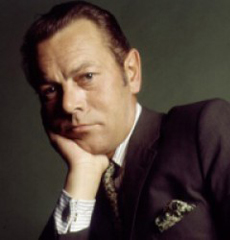
"I want to make music for everyone. It must be enjoyed by all. Otherwise it is pointless."
Includes three bonus tracks: Take Me, Zambesi and Tootie Flutie.
Sound Engineer: Peter Klemt
Concept & Text: Bert Kaempfert Music, Hamburg
Translation: Angela Schumacher
Design: LOGICON HAMBURG
Polydor 537 472-2 (deleted)
Biography
Bert Kaempfert's great breakthrough came in 1960 with his No. 1 hit in the USA, Wonderland By Night, which went on to conquer the world. He was the first German bandleader to be awarded a gold record in the USA. DJs in the American music magazine Cash Box voted his orchestra "Band of the Future."
In 1968 Bert Kaempfert won no less than five of the annual BMI awards in New York in the category of "most played compositions" for Lady, Spanish Eyes, Strangers In The Night, Sweet Maria and The World We Knew.
In 1974 "Mr. Invisible" received triumphant applause at his first two live concerts in London's Royal Albert Hall. At the early age of 56, Bert Kaempfert died of a stroke on 21 June 1980. That his music and compositions have a firm place in international music life is emphasized by numerous posthumous awards. In June 1993 he was elected to "The Songwriters' Hall of Fame" in New York - the first German to receive this most prestigious of all international awards.
Safari Swings Again
This album was recorded in the Polydor Studio in Hamburg at the beginning of October 1976 by the usual recording engineer, Peter Klemt. As the title suggests, Bert Kaempfert intentionally wanted to follow in the footsteps of his legendary LP A SWINGIN' SAFARI from 1962 with his such as Afrikaan Beat, Happy Trumpeter and the title number A Swingin' Safari which brought him success all over the world and two gold discs. The typical Kaempfert rhythm had been enhanced by a sensational sound coming from the flutes: here Bert Kaempfert oriented himself on the sound produced by blowing penny whistles in a special way as found in South African Kwela music whose style had been influenced by American swing and was very popular with young black people in the townships. "At the rehearsals, Bert Kaempfert tried to get the piccolos to imitate the sound of penny whistles. That was real hard work! But at last he heard what he wanted and Bert was really satisfied to have captured the charm of the whistles in 'his' piccolos," reminisced bass guitarist Ladi Geisler.
This unique sound of the flutes is also heard aplenty in SAFARI SWINGS AGAIN, and is accompanied by a larger orchestra than that of the 1962 production. Further tonal attractions are provided in lengthy solos by Ack van Rooyen (trumpet) and Jiggs Whigham (trombone). The nine original compositions by Bert Kaempfert and Herbert Rehbein are complemented by the delightful Tom Hark with its improvisatory tossing back and forth between the trumpet and trombone, Pata Pata, a top-ten hit from the South African-born Miriam Makeba, and the traditional sugar Bush, taken from the South African song collection "Songs from the Veld" and performed by such great artists as Doris Day and Frankie Laine. And last but not least we have Henry Mancini's Baby Elephant Walk from the film "Hatari!" starring John Wayne, which, bathed in Bert Kaempfert's "Afrikaan Sound," takes on a whole new interesting dimension.
Fourteen years lie between these two LP productions - each of which having its own particular attraction. And what is more natural and fitting than to include in this CD three delightful bonus tracks, Take Me, Zambesi and Tootie Flutie, from the first "Safari" production?!